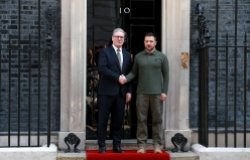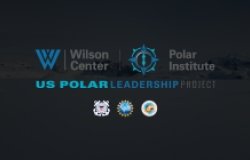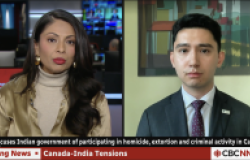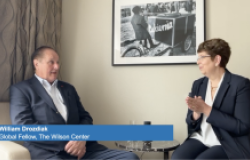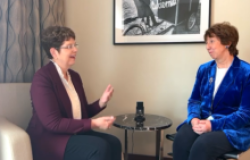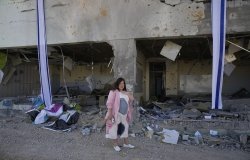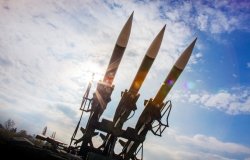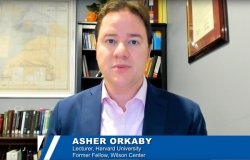NATO's Evolving Role in Afghanistan
A forum discussed both the progress and remaining challenges facing Canada and other NATO members as the organization attempts to work toward building an Afghanistan free of conflict, destruction, and poverty.
Overview
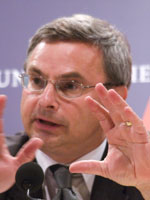 NATO remains an essential component of the international community's efforts to work with Afghan officials in building a stable, prosperous, and democratic Afghanistan. Canada has been a major contributor to this effort, particularly in securing the war-torn southern region of the country. Nevertheless, efforts to secure and rebuild Afghanistan continue to be hampered by a growing insurgency, prompting a contentious political debate in Canada on whether or not to end its military involvement in the country. On June 23, 2008, the Canada Institute, in collaboration with the Council of the Americas, hosted a forum for a timely discussion on the progress and remaining challenges facing Canada and other NATO members as it attempts to work toward building an Afghanistan free of conflict, destruction, and poverty.
NATO remains an essential component of the international community's efforts to work with Afghan officials in building a stable, prosperous, and democratic Afghanistan. Canada has been a major contributor to this effort, particularly in securing the war-torn southern region of the country. Nevertheless, efforts to secure and rebuild Afghanistan continue to be hampered by a growing insurgency, prompting a contentious political debate in Canada on whether or not to end its military involvement in the country. On June 23, 2008, the Canada Institute, in collaboration with the Council of the Americas, hosted a forum for a timely discussion on the progress and remaining challenges facing Canada and other NATO members as it attempts to work toward building an Afghanistan free of conflict, destruction, and poverty.
Canadian Perspectives of the Mission
Decades of cuts to Canada's military contributed to the country's reputation as a "laggard" in NATO among some members of the Alliance, argued Joel Sokolsky of the Royal Military College of Canada. Nevertheless, Canada participated in military operations in areas suffering from internal conflict in the 1990s, including Bosnia and Kosovo, which helped prepare the Canadian military for a leading role in securing Afghanistan's war-torn southern region. Sokolsky also noted that Canada's military effort in Afghanistan, which includes the deployment of 2,500 troops, has allowed Canada to earn back the respect of its fellow NATO members. Ironically, Canada's massive effort in Afghanistan has put the country in a position to criticize some European members of the Alliance for not contributing more troops and resources toward operations in Afghanistan, highlighting just how far Canada has come since its days of being accused as a laggard and free-rider within NATO, he said.
Domestically, Afghanistan has completely reshaped the civil/military relationship, said Sokolsky. He credited Rick Hillier, Canada's Chief of Defense and Commander of the NATO-led International Security and Assistance Force in Afghanistan, for leading the transformation. Since Canada's involvement in Afghanistan, Hillier and other senior Canadian military officials have become far more vocal on recommending defense policies, maintained Sokolsky. Canada's effort in Afghanistan has also generated a new-found respect for the country's military among Canadians. While Canada's military has increased in popularity, said Sokolsky, "there has been no breakthrough in public opinion" regarding the country's involvement in Afghanistan. He noted that many Canadians still believe Canada's involvement in the war is simply to please the United States, and stated that a vast majority of Canadians would rather see Canadian forces in more of a peacekeeping rather than a combat role if given the choice.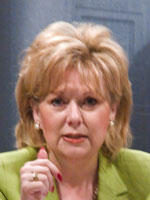 Pamela Wallin, a member of the Independent Panel on Canada's Future Role in Afghanistan, maintained that the media are partly to blame for the unpopularity of Canada's ongoing effort to secure and reconstruct Afghanistan. She noted that reporters have limited access to enter and cover stories in Afghanistan and because of that, fail to see the signs of progress and important humanitarian work currently being conducted in the country. In contrast, Western reporters tend to focus solely on causalities, which fuels public resentment and conveys a sense of failure regarding NATO's efforts in Afghanistan. Wallin pointed out that more than 200,000 copies of the Independent Panel's report—featuring policy recommendations, remaining challenges, and progress made in Afghanistan—were downloaded within the first week of its publication in January 2008. Wallin said that such a large number of downloads indicates that Canadians are "starving for information" regarding the current progress of NATO's mission in Afghanistan.
Pamela Wallin, a member of the Independent Panel on Canada's Future Role in Afghanistan, maintained that the media are partly to blame for the unpopularity of Canada's ongoing effort to secure and reconstruct Afghanistan. She noted that reporters have limited access to enter and cover stories in Afghanistan and because of that, fail to see the signs of progress and important humanitarian work currently being conducted in the country. In contrast, Western reporters tend to focus solely on causalities, which fuels public resentment and conveys a sense of failure regarding NATO's efforts in Afghanistan. Wallin pointed out that more than 200,000 copies of the Independent Panel's report—featuring policy recommendations, remaining challenges, and progress made in Afghanistan—were downloaded within the first week of its publication in January 2008. Wallin said that such a large number of downloads indicates that Canadians are "starving for information" regarding the current progress of NATO's mission in Afghanistan.
Ensuring Victory Allied forces require a better understanding and broader perspective of what is driving the current insurgency in Afghanistan in order to achieve victory, said Thomas Lynch of the Brookings Institution. He maintained that Pakistan and Afghanistan have historically been important regions for the jihad. Extremists operating in that region, argued Lynch, are aware that they do not need to defeat NATO forces in Afghanistan to win; rather, to achieve victory they only need to maintain an "enduring presence" in the country that will send a message to Afghans that they will return and regain control after NATO forces leave. Consequently, developing a long term strategy to defeat the insurgency is essential to have any chance of establishing a stable and democratic Afghanistan. Part of this strategy, he said, is ensuring the continued development of the Afghan national and police forces.
Allied forces require a better understanding and broader perspective of what is driving the current insurgency in Afghanistan in order to achieve victory, said Thomas Lynch of the Brookings Institution. He maintained that Pakistan and Afghanistan have historically been important regions for the jihad. Extremists operating in that region, argued Lynch, are aware that they do not need to defeat NATO forces in Afghanistan to win; rather, to achieve victory they only need to maintain an "enduring presence" in the country that will send a message to Afghans that they will return and regain control after NATO forces leave. Consequently, developing a long term strategy to defeat the insurgency is essential to have any chance of establishing a stable and democratic Afghanistan. Part of this strategy, he said, is ensuring the continued development of the Afghan national and police forces.
Lynch stressed, however, that eliminating safe havens for Taliban and other extremists in countries bordering Afghanistan, most notably Pakistan, must be addressed to achieve sustainable progress. He noted that the Pakistani government currently believes that addressing jihadism does not require "a physical approach," which remains a grave problem for ongoing efforts to stabilize and secure the country.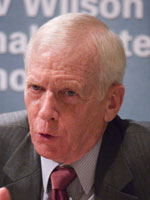 Charles Barry of NDU noted that there are signs of hope that the situation in Afghanistan could improve in the near future. He cited General Petraeus' recent nomination to oversee U.S. efforts in Afghanistan as an indication that the "right leadership" may be in place to help spur progress in the country. Speaking from a broader perspective, Barry said that NATO's mission in Afghanistan has helped build a large reservoir of experienced NATO troops and helped foster greater interoperability between Alliance member militaries that will be crucial to achieve success in future missions. He also stressed that the EU must do a better job of compelling key member states to contribute more resources to NATO's mission in Afghanistan.
Charles Barry of NDU noted that there are signs of hope that the situation in Afghanistan could improve in the near future. He cited General Petraeus' recent nomination to oversee U.S. efforts in Afghanistan as an indication that the "right leadership" may be in place to help spur progress in the country. Speaking from a broader perspective, Barry said that NATO's mission in Afghanistan has helped build a large reservoir of experienced NATO troops and helped foster greater interoperability between Alliance member militaries that will be crucial to achieve success in future missions. He also stressed that the EU must do a better job of compelling key member states to contribute more resources to NATO's mission in Afghanistan.
Measuring Progress
There was a general consensus among panelists that a principal problem with NATO's mission in Afghanistan is the continued absence of a way of measuring success and progress. Barry noted that continuing to build and improve Afghanistan's infrastructure offers one method of measuring sustainability in the country. Wallin also stressed the need to establish development benchmarks as a means of judging what victory in Afghanistan may look like. She noted that the Canadian government's strategy toward Afghanistan is moving in this direction, as highlighted in its response to the Independent Panel's report. This response includes the establishment of focused measurable development goals in Afghanistan, to include eradicating polio, providing clean drinking water to Afghans, and providing funding to build and maintain 50 schools in the country. In discussing how best to define victory in Afghanistan, Wallin maintained that ultimately, "a win for the West is an intelligent exit strategy where we have left the Afghans prepared to do what they want to do."
Drafted by Ken Crist, Program Associate, Canada Institute
202-691-4270
Hosted By

Canada Institute
The mission of the Wilson Center's Canada Institute is to raise the level of knowledge of Canada in the United States, particularly within the Washington, DC policy community. Research projects, initiatives, podcasts, and publications cover contemporary Canada, US-Canadian relations, North American political economy, and Canada's global role as it intersects with US national interests. Read more
Thank you for your interest in this event. Please send any feedback or questions to our Events staff.
